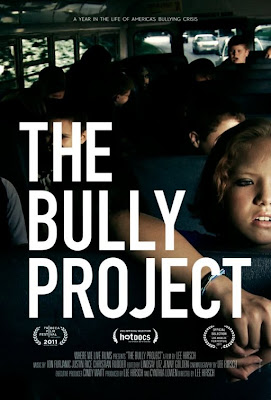 FIGHTING BACK
FIGHTING BACKAn interview with BULLY director, Lee Hirsch
By now, you’ve no doubt heard about the controversial new documentary, BULLY. This important film does not spend its time forcing statistics in its audience’s face, like how 13 million kids will be bullied this year in North America, or how 3 million kids will skip school to avoid being bullied. No, instead BULLY does something that for some reason has been absent thus far in the bullying conversation; it gives a voice to those who know how it feels first hand and that voice is both eye opening and heartbreaking.
“It is amazing to me that there has been so little done on this issue,” director, Lee Hirsh, tells me when we meet just a few hours before a screening and leading a town hall discussion on the topic itself. “To me, it’s such a connective piece about the human experience. Everybody has a story. Everybody has a connection to it. This film gives a lot of people a voice.”
Hirsch, a Long Island, New York native, began making what was originally entitled THE BULLY PROJECT in 2009, when he started following the lives of five different young people throughout their school years. Given the sensitive nature of the subject, Hirsch believed his own experience with bullying made him an ideal choice to tackle the daunting topic. “Part of it was that I was bullied so it was part of my own narrative. I felt like I could do it, like I had the emotional space and connection to be able to tell this story and be in that world. I just saw it in my head because of that.”
 |
| Alex is 12 and is bullied because he does not fit in |
After premiering to triumphant reviews at the Tribeca and HotDocs film festivals last year, BULLY was picked up by The Weinstein Company for distribution. Hirsch never expected a major movie company to pick up the film to begin with so the attention the film is receiving now, thanks to a widely publicized battle with the Motion Picture Association of America over an R-rating, is beyond anything he ever imagined. “The rating argument certainly gave us a lot of energy. We never could have bought that publicity or awareness for such a small film.”
In order for the film to be given a PG-13 rating, a rating it has widely received here in Canada across the provinces, there can be no more than one usage of the word, “fuck”. BULLY has six F-words, hence the R. An R-rating means that the audience the film is intended for cannot see the film without parental permission. It also means the film will not likely screen in schools, where it should be mandatory viewing. Hirsch embraces the controversy though. “It is a blessing in disguise because it rallied people to the film. That’s the stuff of movements and that’s really exciting.”
 |
| Kelby is 16 and is bullied because she is a lesbian |
Since meeting Hirsch for this interview, The Weinstein Company has cut three F-words from the final cut and the MPAA has made a special exception for the film and lowered the rating to PG-13 just in time for its wide American release.
Now, many more will hear the plight of these kids, whose experiences are varied and not so dissimilar to what most victims go through. Simply opening up this dialogue is impressive considering the shame that looms over bully victims. Hirsch elaborates his view on this, “It seems there is a stigma when it comes to talking about bullying. But there is a moment, a shift, when victims feel like they have agency to talk about it. Then the floodgates open.” The film points its most accusatory finger at school administrators and authorities for this. “With bullying, you’re going against existing beliefs that ‘kids will be kids’ and ‘everybody goes through this.’ That shuts people down.”
 |
| Hirsch, happy with BULLY's success |
The goal now that people are talking about bullying is to make change. On some levels, BULLY may be preaching to the converted but if the right people see it, and if its shown in schools, then the people who need to see it, will see it, then suddenly change is possible. Hirsch offers this advice for a more peaceful future. “You don’t have to get involved with government to do something about bullying. You can just make little choices. You can act with empathy, step up for somebody, talk to your kids more. Small acts do add up. That’s change.”
With more young people killing themselves because of bullying, this particular change is long overdue.
 BULLY
BULLYDirected by Lee Hirsch
While the act of bullying may seem to some like a convenient and fashionable talking point for the liberal media, it is in fact a real problem in schools around the globe and Lee Hirsch’s documentary, BULLY, gives the cause the real face it has so desperately needed. Hirsch focuses his attentions on a handful of young people, all different ages and from different walks of life, who have all been bullied and still live the experience regularly. While there isn’t too much bullying caught on tape, the effects on these innocents is heartbreaking. BULLY will have you crying within five minutes of its start and wanting to make the world a better place by the time it’s done.











No comments:
Post a Comment